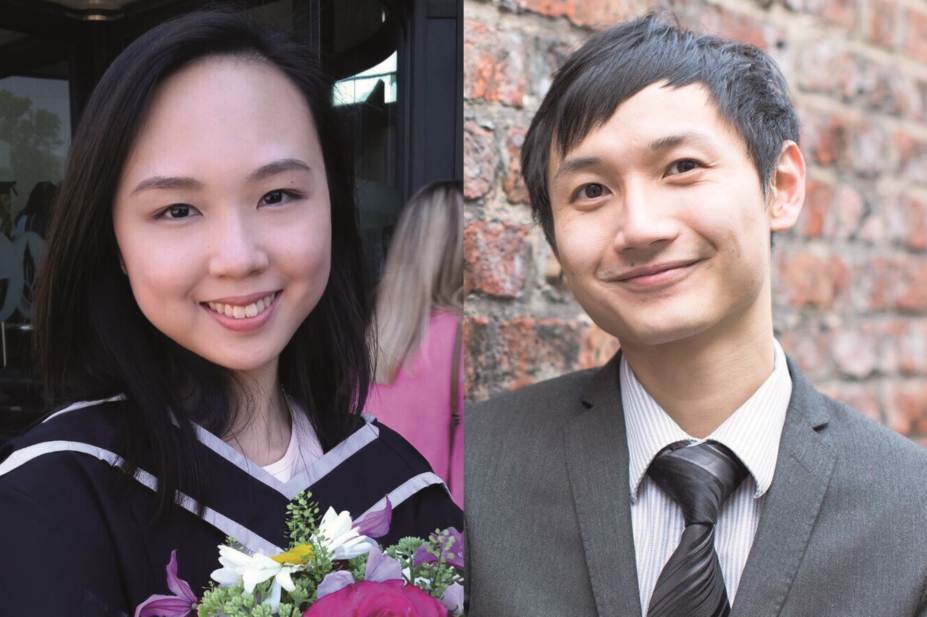
Courtesy of Tina Chung and Kwok Bun To
Tina Chung and Kwok Bun To are two of the first batch of students to complete the fully accredited five-year integrated Master of Pharmacy (MPharm) degree launched at the University of Nottingham in 2012. Here they describe their experience.
We are delighted to be among the first to graduate from this innovative course. We decided to complete the integrated masters as opposed to a traditional pharmacy degree because we had the opportunity to gain experience and develop our professional roles in different sectors during the two placements. Being students while completing our training means we received support from both the university and our placement providers. For international students, it allowed them to keep their student status for visa purposes.
During years 1–3, students from both the integrated course and the traditional four-year course complete their university modules simultaneously. However, during semester one of year 4 and semester two of year 5, integrated pharmacy course students undergo preregistration placements which are each six months long. During the one-year gap between placements, students join their peers who are in their final year of the traditional course to undertake modules at university to further improve clinical knowledge and leadership skills.
The university facilitators work hand-in-hand with the placement providers to ensure that we get top-quality training and support. We were able to develop personalised training plans with our placement tutors and university facilitators at the start of the placement. Weekly meetings with our tutors were arranged to discuss progress and to set goals in order to achieve all 76 GPhC performance standards expected of a newly registered pharmacist, within the required timeframe.
To us, our pre-registration placements appeared to be more hectic than the traditional pre-registration training. In addition to fulfilling the usual MPharm requirements, we were also required to work fulltime. This was initially daunting for both of us, as a lot of personal time outside of work was required to produce electronic portfolios of evidence to record our progress and prove competence. Completing work-based assessments was more difficult than we expected as it required colleagues to observe our performance and provide feedback. This at times was unfeasible, especially in a busy pharmacy environment. The paperwork required certainly increased the workload for students and tutors. Fortunately, the workload became more manageable as we gave some feedback to the university.
The course provided us with an early submission date for our portfolio. This suits students who wish to graduate earlier in order to go back to their home countries to sit their local registration exams. On the other hand, placement facilitators and tutors are very helpful. They offer support and advice to students who want to find a job in the UK. Some of us have already secured a job here.
One suggestion we would make is around annual leave allowance and increasing the flexibility of students to take their annual leave. We were allocated ten days for each six-month placement because of the structure of the course. However, there is a general feeling among students that time off in addition to the allotted ten days for our second placement would allow for sufficient preparation for the registration exam. Pre-registration pharmacists not aligned with an integrated course typically have 20–27 days of annual leave throughout the year with the added freedom of choosing when they wish to use that time.
We recommend future students complete an integrated degree, especially for those who enjoy a challenge and want a taste of working in different sectors. This course provides students with a mix of experiences working in both community and hospital sectors where the normal pre-registration scheme usually only covers one. This is an advantage of this course and is good for students’ future careers. Students can also apply what they learn in their placements to their university modules and vice versa. It helps to consolidate clinical knowledge and is an effective way of applying learning to practice. The degree was tough but the structure helped us prepare for the registration exam, and no doubt for future practice.
Tina Chung graduated from the integrated MPharm degree at the University of Nottingham in July 2017 having completed her first six-month pre-registration placement at Nottingham City Hospital and her second placement at Manor Pharmacy Wheathampstead.
Kwok Bun To will graduate from the integrated MPharm degree at the University of Nottingham in September 2017 having completed his first six-month pre-registration placement at Royal Derby Hospital and his second placement at Nottingham City Hospital.


